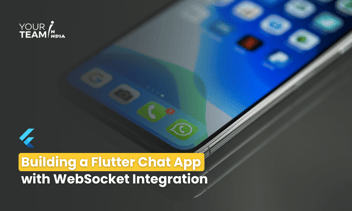Quick Summary: This comprehensive guide dives into real-time communication in Flutter with WebSockets. It explores how to implement WebSocket connections in Flutter apps, enabling seamless and efficient real-time data exchange for enhanced user experiences.
Introduction
- The need for real-time communication in modern applications.
- Overview of WebSockets as a protocol for achieving real-time communication.
- How Flutter supports WebSockets for building interactive and dynamic apps.
Getting Started with WebSockets in Flutter
- Introduction to WebSockets
- Explanation of the WebSocket protocol.
- Differences between HTTP and WebSocket communication.
- Code snippets illustrating WebSocket initialization in Flutter.
|
import 'package:web_socket_channel/web_socket_channel.dart'; |
WebSocket Communication Lifecycle
- Overview of the WebSocket communication lifecycle (connection, data exchange, closure).
- How Flutter handles WebSocket events.
- Code examples for handling WebSocket events in Flutter.
|
channel.stream.listen( |
Implementing Real-Time Features with WebSockets
- Chat Application Example
- Building a simple chat application using Flutter and WebSockets.
- Code snippets for sending and receiving chat messages in real-time.
|
void sendMessage(String message) { |
Real-Time Updates in Widgets
- Integrating WebSockets for real-time updates in Flutter widgets.
- Code examples demonstrating dynamic UI updates based on WebSocket events.
|
// UI widget that updates in real-time |
Securing WebSockets in Flutter Apps
- WebSocket Secure Connections (WSS)
- Importance of secure WebSocket connections in production apps.
- Steps for establishing secure WebSocket connections in Flutter.
- Code snippets for connecting to secure WebSocket servers.
|
final secureChannel = WebSocketChannel.secure( |
Authentication and Authorization
- Implementing authentication and authorization for WebSocket connections.
- Code examples for sending authentication tokens with WebSocket requests.
|
// Send authentication token during WebSocket connection |
Conclusion
- Recap of the benefits of using WebSockets for real-time communication in Flutter.
- Developers should be encouraged to explore and leverage real-time features in their Flutter apps.
- Reminders about security considerations and best practices when using WebSockets.
Hire Flutter developers to elevate your Flutter app design. Unlock the full potential of Flutter layouts with our professional Flutter developers.








